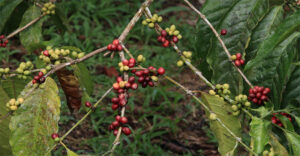
Forests in Papua and West Papua Provinces are not free from threats. The encroachment and conversion of primary forest into oil palm plantations and Industrial Plantation Forests have occurred in several locations.
This condition needs attention from various parties. The reason is that this change in the function of forests on the Earth of Paradise will have an impact on the surrounding ecosystem and society and in the condition of the forest.
This was shown in four short films that were screened in Diskusi Lingkar Papua (DLP) held by the EcoNusa Foundation in collaboration with Papuan Voices in Jakarta, Friday (9/14). Films titled Life in the Forest of Mobak, Mama Kasmira, Mama Mariode and Wasur – The Last Hunter are films that have been screened at the Papua Film Festival II organized by Papuan Voices. The four of them told about the psychological, physical and cultural struggles faced by the people in Papua about the changes in their natural conditions.
Present at the monthly discussion were Deputy Chief Expert of the Presidential Office V Sylvana Apituley, General Coordinator of Papuan Voices Markus Binur, Film Director of Mobak Forest Ottow Wanm, Film Director Mama Mariode and Stand Up Comedian Yewen Papua. And Melda Wita Sitompul, Director of the EcoNusa Foundation as the moderator.
Melda said that Diskusi Lingkar Papua was a #Badatat #JagaHutan discussion in order to bring the beauty of the Land of Papua closer to us who live outside Papua. Diskusi Lingkar Papua will raise issues of forest enchantment, vulnerability as well as local wisdom of indigenous Papuans. In addition we can also present stories of conflict, inequality and injustice in Papua. This is done in order to support the spirit of the government and people outside Papua to feel they own the forests and seas of Papua and together help the Papuan people to #Badadat #JagaHutan.
Papua’s location which is far from the Central Government in Jakarta often makes the real conditions in the area less audible. For this reason, film has become an effective medium for delivering messages audio and visual.
“The campaign to protect the environment is more effective with audio visual, because it touches the people watching and also because there is a very limited reading culture in the villages, the community can get the message, as well as the government and people outside the forest area,” said Markus Binur.
One tangible form of the effectiveness of films as campaign material is the birth of regional regulations that favor indigenous peoples. Markus said this was done by the Jayapura Regent because he saw a film made by Papuan Voices.
“So they drafted a regional regulation to accommodate the rights of indigenous peoples to forest tenure, the government’s response to start in that direction in our opinion is extraordinary,” Markus added.
Film media also makes Papuans more confident. This was shown by the film Mobak Forest, the main actor Leo Wambitman was said to actually encourage filmmaking to convey the message to be conveyed to the outside community.
“He asked us to record him, he said he wanted to talk about the forest and we were asked to take this even to the Raja Ampat Regent,” Ottow Wanma said.
Agustinus Kalalu as Film Director Mariode added if the film became one of the effective channels of environmental campaigns. In the film he worked on, courage from Mama Mariode was framed to spur the same guts on the men’s side. “Because he is the only one who dares to talk, so we have to tell the story of these brave mothers so that men also don’t need to be afraid and don’t even sell land,” Agus explained.
“So far the people only know what’s negative about Papua, the national community must also know everything that is good and positive and the progress made during Pak Jokowi’s administration,” said Sylvana.
He specifically assessed film as a good educational tool. Moreover, films produced by involving the local community. With the film, the story of Papua being raised to the national level was seen by him as effective.
“National public indeed needs to get clear and true information about the situation in Papua, both by the work of the national and regional governments and by social institutions. Also, so that we are all aware of the challenges we face to improve the quality of life of indigenous Papuans, “concluded Sylvana




